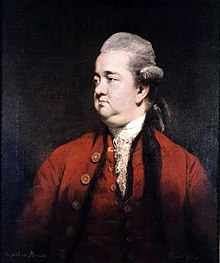Edward Gibbon
| Edward Gibbon | |
|---|---|

Portrait, oil on canvas, of Edward Gibbon by Sir Joshua Reynolds (1723–1792)
|
|
| Member of Parliament for Lymington | |
|
In office 1781–1784 |
|
| Preceded by |
Samuel Salt Edward Eliot |
| Succeeded by |
Samuel Salt Wilbraham Tollemache |
| Member of Parliament for Liskeard | |
|
In office 1774–1780 |
|
| Preceded by |
Harry Burrard Thomas Dummer |
| Succeeded by |
Harry Burrard William Manning |
| Personal details | |
| Born | 8 May 1737 Putney, Surrey, England |
| Died | 16 January 1794 (aged 56) London, England |
| Nationality | British |
| Political party | Whig |
| Alma mater | Magdalen College, Oxford |
Edward Gibbon FRS (/ˈɡɪbən/; 8 May 1737 – 16 January 1794) was an English historian, writer and Member of Parliament. His most important work, The History of the Decline and Fall of the Roman Empire, was published in six volumes between 1776 and 1788 and is known for the quality and irony of its prose, its use of primary sources, and its open criticism of organised religion.
Edward Gibbon was born in 1737, the son of Edward and Judith Gibbon at Lime Grove, in the town of Putney, Surrey. He had six siblings: five brothers and one sister, all of whom died in infancy. His grandfather, also named Edward, had lost all of his assets as a result of the South Sea Bubble stock market collapse in 1720, but eventually regained much of his wealth, so that Gibbon's father was able to inherit a substantial estate.
As a youth, Gibbon's health was under constant threat. He described himself as "a puny child, neglected by my Mother, starved by my nurse". At age nine, he was sent to Dr. Woddeson's school at Kingston upon Thames (now Kingston Grammar School), shortly after which his mother died. He then took up residence in the Westminster School boarding house, owned by his adored "Aunt Kitty", Catherine Porten. Soon after she died in 1786, he remembered her as rescuing him from his mother's disdain, and imparting "the first rudiments of knowledge, the first exercise of reason, and a taste for books which is still the pleasure and glory of my life". By 1751, Gibbon's reading was already extensive and certainly pointed toward his future pursuits: Laurence Echard's Roman History (1713), William Howel(l)'s An Institution of General History (1680–85), and several of the 65 volumes of the acclaimed Universal History from the Earliest Account of Time (1747–1768).
...
Wikipedia
